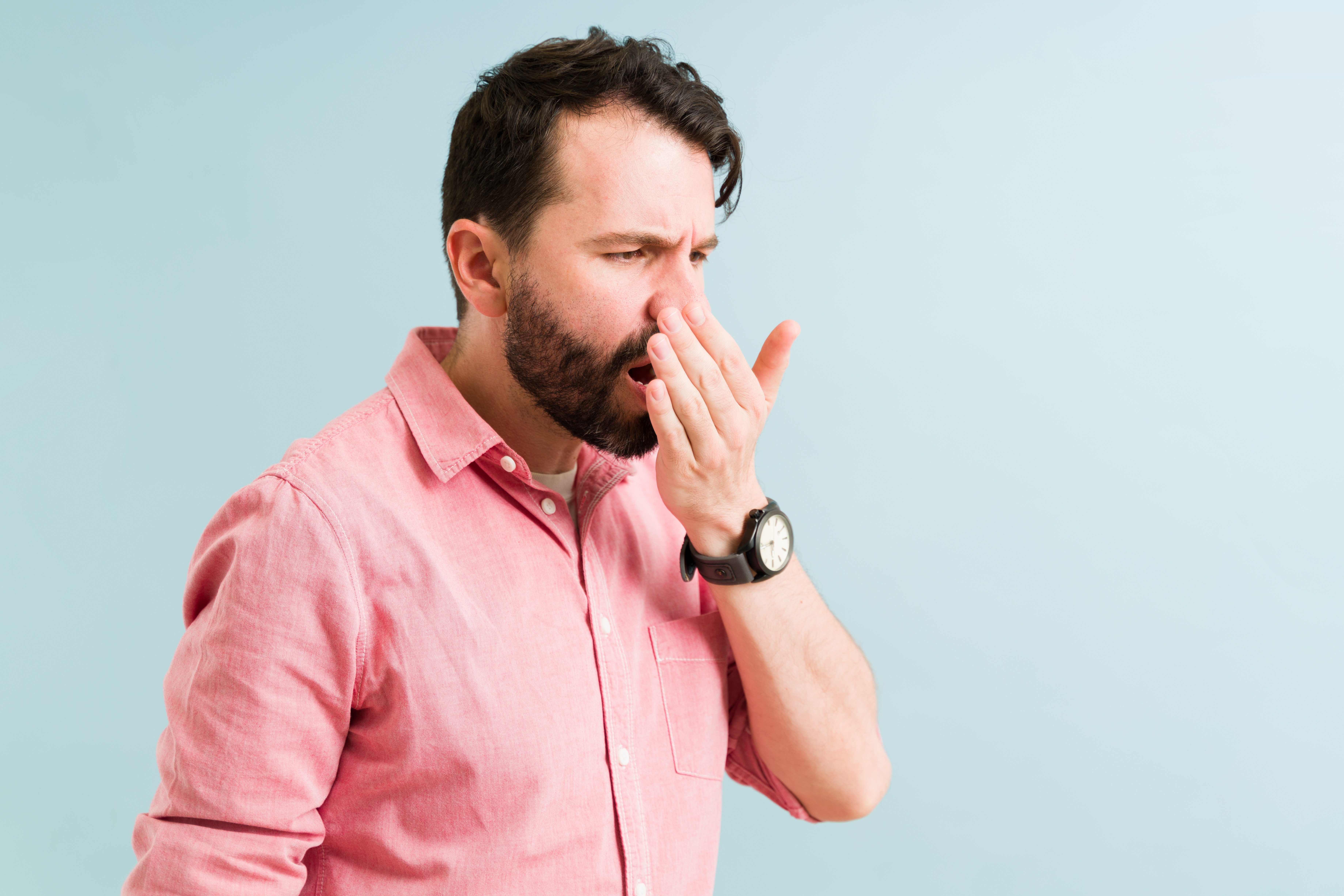What is Halitosis (Chronic Bad Breath)?

Summarize with AI
Halitosis is just another name for persistent bad breath, but it’s more than just the occasional morning breath we all experience. It refers to bad breath that sticks around, even after brushing, rinsing, or popping a mint.
Everyone deals with bad breath from time to time, especially after eating certain foods or waking up in the morning. But when bad breath becomes a constant issue, it may signify something more serious. Chronic halitosis can last for hours, days, or even longer, and in many cases, people don’t even realize they have it until someone else points it out.
Signs You May Have Chronic Bad Breath
Bad breath isn’t always easy to detect on your own, and unfortunately, most people won’t bring it up unless they feel they have to. Here are a few simple ways to check for yourself:
- Check your tongue: Look in the mirror and examine your tongue. A white or yellow coating can signify bacterial buildup, which often causes bad breath.
- Try the wrist test: Lick the inside of your wrist, wait a few seconds, and then smell it. If it smells unpleasant, your breath might too. (Just remember to wash your wrist beforehand!)
- Cup and sniff: Cup your hands over your mouth and nose, breathe out through your mouth, then quickly inhale through your nose. This quick test can help you detect odors.
- Use a spoon or scraper: Gently scrape the back of your tongue with a spoon, wait a few seconds, and smell the residue. It can give you a more direct sense of any odors.
- Pay attention to social cues: If friends or coworkers frequently offer you gum or step back slightly during conversation, it might be time to investigate further.
Top Dental Causes of Bad Breath
It's generally a good idea to choose a local dentist who’s close to your home or office. This will make it much easier to make appointments that fit your schedule. It will also allow you to easily arrive for your appointment on time or a bit early if necessary. You should also make sure the dental office will be open on the days and times when you are most likely to need an appointment.
Plaque and Food Debris Buildup
When food particles aren't entirely removed, they collect between teeth, along the gumline, and on the tongue. This leads to plaque, a sticky film of bacteria that can cause bad breath and other oral health issues if left untreated.
Gum Disease and Tooth Decay
Persistent bad breath can indicate gingivitis or periodontitis (gum disease). Infected gums or decaying teeth create pockets where bacteria thrive, producing foul odors that brushing alone can't fix.
Failing Dental Work
Broken or poorly fitted crowns, fillings, or dentures can trap food and bacteria, becoming hidden sources of bad breath. If dental restorations are loose or worn down, they may need to be repaired or replaced.
Underlying Medical Conditions That Can Cause Bad Breath
If good oral hygiene isn’t solving the problem, bad breath might be linked to something else going on in your body.
- Dry Mouth (Xerostomia): Saliva helps clean your mouth. When there isn’t enough of it, often due to mouth breathing or certain health conditions, odors can build up.
- Medication Side Effects: Some medications cause dry mouth or release chemicals that affect your breath as they break down.
- Other Health Conditions: Bad breath can also be related to diabetes, acid reflux (GERD), sinus infections or postnasal drip, bronchitis or pneumonia, or liver or kidney disease.
If your breath doesn’t improve with daily care, your dentist or doctor can help diagnose the cause.
How Can I Avoid Bad Breath?
The best way to prevent bad breath is by brushing and flossing regularly. You should also visit your dentist for regular cleanings to eliminate tartar and plaque from hard-to-reach areas. There are also certain foods that can make your breath smell foul. Onions, garlic, and coffee can all be detected on your breath for up to 72 hours after consumption. Some foods, such as garlic, even emit odor through the lungs after digestion.
What Can Help:
- Brush twice a day with fluoride toothpaste
- Floss daily to remove food particles between teeth
- Avoid tobacco and limit strong-smelling foods like garlic and onions
- Tongue scrapers help remove bacteria and debris that cause odor
- Antibacterial mouth rinses can reduce germs temporarily
- Sugar-free gum boosts saliva flow and helps freshen breath
- Drinking water keeps your mouth moist and flushes away bacteria
- Visit your dentist regularly for cleanings and checkups
What Doesn't Work
- Lemon juice is too acidic and may harm tooth enamel
- Charcoal products are not proven to fight bad breath and may be abrasive
- Home “detox” tricks often mask odor without treating the cause
When to See a Dentist for Bad Breath
If lifestyle changes like brushing more often, staying hydrated, and cleaning your tongue aren’t helping, it’s time to see a dentist. During your visit, your dental team can check for common causes of chronic bad breath, such as plaque buildup, gum disease, tooth decay, or issues with dental restorations.
At Gentle Dental, we take a full-service approach to diagnosing and treating bad breath. We’ll assess your oral health, identify any signs of infection or failing dental work, and recommend solutions that fit your needs. This may include a professional cleaning, antibacterial treatments, or referrals to specialists if your bad breath is tied to a more complex issue.
A quick visit could be all it takes to uncover what’s really going on and help you regain confidence in your smile.
Your Partner in Oral Health: Visit Gentle Dental
Are you struggling with bad breath? Gentle Dental offers comprehensive exams and deep cleanings at over 150 convenient locations, with flexible scheduling, insurance acceptance, and affordable options like our Smile Plan. Count on compassionate, full-service care to help you smile with confidence.

.png)
